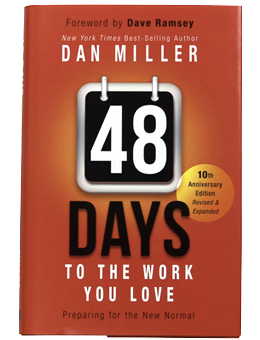Here’s a recent 48 Days Radio Show listener question:
“Dan, I’ve read some of your topics in 48 Days to the Work You Love and I have a couple of interview questions that I have no idea how to respond to. The first one is ‘What did you accomplish in your last position?’ This question ticks me off. The reason is I feel that this is a question that should be asked of someone who has a college degree and has worked at a top-notch company. I’m a 45 year-old woman who has a GED. I felt this question was unfair. How do ordinary people like me who have worked in clerical positions and other low paying positions answer something like this? My second question is how do you answer an interviewer when they ask why you are leaving your present job. The reason is that I don’t like the people that I work with.” Mary
*************************************
Mary,
Consider it a privilege when you are asked what you accomplished in your last position. If you didn’t accomplish anything, why would anyone want to hire you now? You should be very clear that you were great with customer service, organization, planning, handling tough situations, keeping the office neat, or whatever is true for you. If you have clear areas of competence, you will not stay in low paying positions. If you have no clear area of expertise, it’s amazing you can get any job. Why would anyone pay you if you can’t make a distinctive contribution?
Keep in mind that a lot of “ordinary and uneducated” people are now leading major companies and making extraordinary amounts of income. People like Bill Gates, Oprah, Mark Zukerburg, Brad Pitt and Michael Dell are all college drop-outs but have certainly found unique areas of contribution.”
If you leave a position because you don’t like the people there, simply explain that you did not think it was a good fit and you are exploring new opportunities that are a better match for your skills. Stay positive and focus on how you can add to the company’s success.
Watch this video to help you understand how to present yourself with confidence. Don’t underestimate what you have to offer.







One must assess to what or from what we are running!! You’re right about the right attitude. As one who has interviewed many people, I’m interested in what they can do for my company and why we should consider investing time, effort, and resources in them. I really didn’t care about the education unless the position required specialized degrees. And even then, 20 years of on the job experience outweighs any freshly minted college graduate any time in my book. Provided that is 20 years of experience and accomplishment, and not one year 20 times over!!
Great questions.
Spot on advice Dan. I’ve been a recruiter for 14 years and I prep every candidate I send to a client. That prep includes helping them to be able to explain what they accomplished and learned at every job they had and why they transitioned from that job. All with no condemnation of a former employer, regardless of how bad it was. I also prep them to have three good reasons that they are interested in, and qualified to work for, the company they are interviewing. The highest impact prep component, however, is to change their perspective from being a job seeker to a problem solver and going in as someone who can relieve the employers pain. It’s startling to me that most candidate never view the interview process from that perspective i.e. is all about “me, me, me” and not “them” – the client.
Keep up the good work, Dan.
My son is a recent high school graduate who is confused and fearful of the future because he’s “not going to college”. In his young mind he feels that there are limited options for him. Clearly, this is flawed thinking. He has many options; as many as his imagination can create. By moving forward with confidence, I advised him, he will gain clarity which in turn will produce direction. Like Mary, it’s tempting to narrow our thinking to what we can’t do. I believe this can become a crutch because it a slick sabotage by giving us the allure that the ultimate responsibility is out of our control. Which is simply not the truth. Why be a victim when you can be victorious with shifts in thinking and strategy.
Great post. Even greater counsel!
Ah thanks Julie. You are so right – not going to college is not a limiting factor. In many ways it is the opposite. Those who go to college right out of high school then often feel restricted for the rest of their lives by that one area of study.